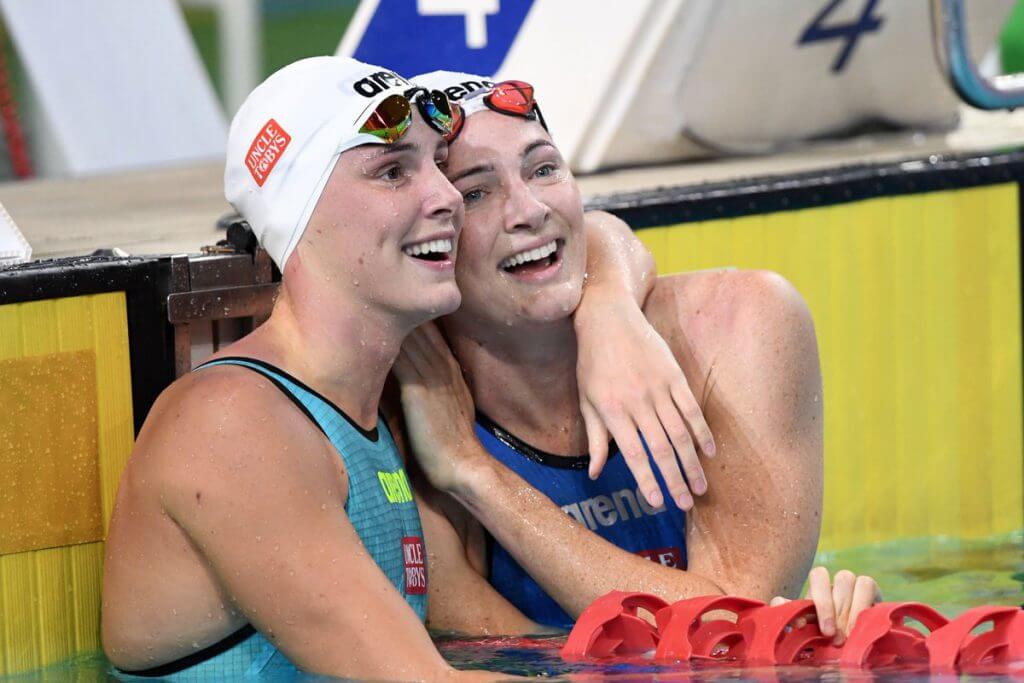The Gene Pool: How Swimming Talent is Nurtured Through Generations

The Gene Pool: How Swimming Talent is Nurtured Through Generations
By Vanessa Steigauf, Swimming World College Intern
There are impressive stories about cases where talent runs deep in families. If we have a look at current and retired world-class athletes, chances are, we find a bunch who have siblings, parents, or grandparents who were equally successful in the sport. Especially for swimmers, divers, and synchronized swimmers, in some families it seems like chlorine has its particular place in their DNA. Some families just spawn world-class athletes in the pool, generation after generation.
Swimming Dynasties – Talent Running in Families
The Campbell-Sisters from Australia are one example. Cate and Bronte Campbell are both members of the Australian national team who already made it to the Olympics several times in their careers. This summer we can see them both on the screen again, competing at the Olympics in Tokyo. They both got taught how to swim by their mother – a former synchronized swimmer.
Another example is former U.S. swimmer Gary Hall Jr., whose father and uncle were on the U.S. Olympic swimming team several times, Gary Sr. collecting several Olympic medals. His grandfather was part of the U.S. national swimming team as well.
Examples where talent runs in families are spread all over the world. The German swimmer Ramon Klenz, who broke Michael Gross’s 32-year-old German 200 butterfly record in 2018, is part of a swimming-family as well: His mother made it to the Olympics twice; as well as both his grandparents. His father was part of the German national team and his uncle won a bronze medal at World Championships twice. Now, his younger sister feels the chlorine run through her veins as well – she is among the best junior divers in Germany.
What is it that attracts several generations of the same family to compete in the pool on such a high level? I doubt it is actual chlorine in their DNA. But it isn’t totally wrong that their genes have something to do with it.
The Swimmers’ Genes
Scientists could actually identify 79 markers in the human genome that correlate with athletic talent. Mostly, these genes influence sports that have to do with coordination and power. But to some extent, even endurance athletes can profit from favorable genes. Before we dive in deeper, let’s make one thing clear: there is no such thing as a gene for talented swimmers. Or any other athletes. The talent itself cannot be inherited. When talent runs in families, what is actually inherited, are certain physical characteristics and personality traits that then favor or oppose the probability to develop talent. Body length, muscle fiber proportion (fast- and slow-twitch fibers), and anaerobic abilities are some examples for inheritable characteristics that influence talent.
A Talent’s Environment
It isn’t only the genes that determine the talent and success of athletes. It’s always nature and nurture. The environment in which children grow up has a huge impact on how their genes influence their development. The three major influences on the development of talent are family support, coaching, and training conditions. In most cases, parents who were successful athletes themselves support their children’s dedication to sports and the sacrifices that go hand in hand with the pursuit of their passions.
The environment has a huge impact on the psychological skills the young athlete develops. A genetically gifted athlete is nothing without the right levels of motivation, determination, mental toughness, and commitment. Supportive surroundings increase the probability of the young talent to actually become a successful athlete. Therefore, the environment is a critical factor to explain why talent runs in families.
When we hear astounding stories about talent running in families, may it be in swimming or elsewhere, we now know that there are many factors contributing to this “inheritable talent.” On one hand, there are the genes that partly and indirectly contribute to a person’s predispositions and traits. Those can favor or oppose success in a certain sport. On the other hand, there is the environment in which the athlete develops. The interplay of these two factors is crucial when it comes to “talent.” It is what makes children of champions more likely to become champions as well. And it is what creates sport dynasties, where members of families are excessively talented in a certain sport – generation after generation.
All commentaries are the opinion of the author and do not necessarily reflect the views of Swimming World Magazine nor its staff.



